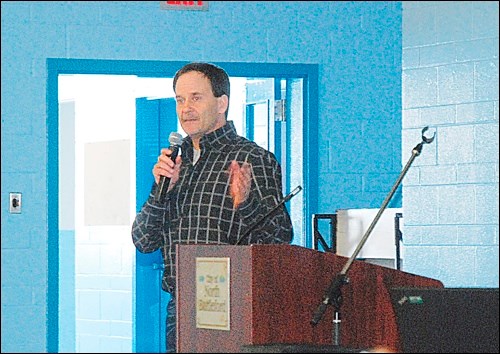Preparedness was the watchword on the minds of municipal officials and emergency personnel from throughout the region Tuesday.
A session on municipal emergency preparedness took place that afternoon at the Don Ross Centre in North Battleford.
Saskatchewan Watershed Authority and the provincial Ministry of Corrections, Public Safety and Policing hosted the session.
The audience included officials from the Battlefords and other surrounding communities and RMs, emergency personnel and officials from North Battleford Fire and Emergency Services and the RCMP, and from several provincial government agencies and Crown corporations, among others.
They were there to learn what they needed to do just in case an emergency hits their area, similar to what happened in 2010 in many areas of the province.
North Battleford was one of the many communities hit by disaster in 2010, with the city government declaring a state of emergency following the July 22 storm that caused major flooding.
An overview of the recent emergency events throughout Saskatchewan highlighted the early portion of the presentation, as several Saskatchewan communities including Maple Creek, Yorkton, Saskatoon, Kawacatoose First Nation, Hudson Bay and other areas experiences storms, flooding and tornado activity during the year.
Participants were shown a series of slides outlining the damage from the storm-ridden year. The participants spent considerably more time at the meeting, though, focusing on what might happen in the year ahead and on efforts to be ready for whatever happens.
A major issue facing much of Saskatchewan in 2011 is the spring run off, with concern the high precipitation and moisture levels could bring flooding to many parts of the province during the spring melt.
Ron Crush, North Battleford city councillor, appeared on behalf of the Saskatchewan Watershed Authority to give the agency's flood predictions for 2011.
Crush pointed to a series of charts showing heavy precipitation and moisture over the past several months in much of the province, with the highest concentration in the central and eastern portions. Both summer and fall precipitation were above normal, Crush reported, and there was a surplus of topsoil moisture in the central and eastern portion as well.
"There's the potential for extremely interesting spring runoff," Crush said of the conditions in the province.
A considerable portion of the rest of the day included discussion and an overview of the Provincial Disaster Assistance Program, including an overview of such things as timelines and eligibility. There was also a session on emergency planning.
Carl Friske from the Office of the Fire Commissioner showed an emergency preparedness booklet entitled "72 Hours - Is Your Family Prepared?"
Seventy-two hours, he said, refers to the amount of time it takes emergency personnel can get to every home in a community to rescue people following a major disaster.
The booklet provides important tips on how to be ready for any emergency, including the importance of stocking up on enough food and water to last for 72 hours. This was particularly important because situations could arise where people could be trapped in their homes for several hours in a weather emergency and might not be able to get in or out, particularly during a winter storm.
Friske also talked about what would be involved if a community needed to declare a state of emergency. It was noted that declaring a state of emergency differed from making an application for disaster relief, as such a declaration allowes municipalities to assume powers over and above what they normally would have.
The distribution of information during an emergency was also discussed.
Municipalities were encouraged to draw up a plan and to prepare in advance. They were encouraged to dust off or discuss contingency plans or review bylaws, and to set up public information lines, have contact numbers ready and the equipment in place.
"We want to be as prepared as possible for this particular year," Friske said.




